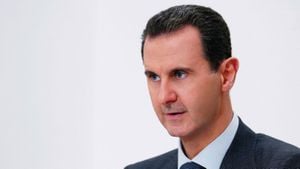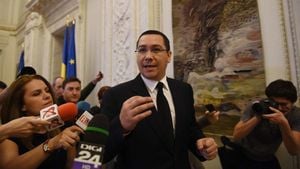Brazil has been rocked by serious allegations of coup plotting, as police formally accuse former President Jair Bolsonaro along with key allies of attempting to overthrow the government following his electoral defeat. The accusations stem from extensive investigations and have far-reaching consequences for Brazilian politics.
The Brazilian federal police have indicted Bolsonaro's vice-presidential candidate, Walter Braga Netto, along with 35 other individuals. This group is suspected of involvement in what officials describe as the attempted violent abolition of democratic rule, coup d'état efforts, and operations as part of a criminal organization. The police investigation has revealed what they allege to be the existence of this coordinated criminal effort aimed at preserving Bolsonaro's presidency after his electoral loss.
These new accusations come almost two years after the 2022 elections, which Bolsonaro lost to the left-wing candidate Luiz Ignacio Lula da Silva by a narrow margin. Post-election, Bolsonaro never acknowledged his defeat publicly, which raised suspicions and contributed to the political crisis engulfing Brazil.
On the social media platform X, Bolsonaro responded defiantly to the police's claims. He described the investigators as "creative" and accused them of acting outside the confines of the law. He vowed to mount a legal battle against the charges, emphasizing his intention to fight the accusations at every level. Bolsonaro remarked, "I will wait for the lawyer. This, obviously, will go to the attorney general's office. It is at the PGR [Prosecutor General of the Republic] where the fight begins."
The police have submitted their detailed reports and indictments to the courts, paving the way for the country’s top prosecutor to decide whether to proceed with formal charges. Apart from Bolsonaro, the list of accused includes figures like his former spy chief, Alexandre Ramagem, and other former government ministers.
The political fallout from these accusations is significant for Bolsonaro's hard-right supporters, who had harbored hopes of him returning to the political arena as he eyes another presidential run slated for 2026. The indictment seems to have dashed many of these ambitions and set the stage for more confrontations within Brazilian political circles.
Earlier this week, Brazilian federal police also arrested five individuals suspected of plotting to assassinate then-president-elect Lula just days before he took office. This incident is part of the larger narrative of violent unrest and upheaval following the election results, as Bolsonaro's supporters feverishly clung to the notion of fraud, inciting unrest.
On January 8, 2023, angry supporters of Bolsonaro stormed Brazil's Congress, presidential palace, and Supreme Court, demanding military intervention to oust Lula. This violent insurrection saw rioters vandalizing significant parts of governmental buildings, with authorities making 1,500 arrests during and after the uproar. Such events have underscored the fragility of democratic practices within Brazil.
The recent accusations against Bolsonaro are not the first legal troubles he has faced since leaving office. Earlier, he was also charged with tampering with his COVID-19 vaccination card and supposedly profiting from illicit sales of jewelry gifted to his administration by the Saudi government.
Brazil's turmoil is not limited to Bolsonaro's actions alone. The country's political climate reflects deep divisions, with widespread concerns about the future of democracy amid accusations of coup plotting and violence. This environment is exacerbated as the country prepares for elections and attempts to heal divisions born from recent political trauma.
Adding complexity to the situation, on the Argentine side of the border, police have arrested Joelton Gusmao de Oliveira, who was wanted by Brazil for conspiracy related to the coup attempt. This 47-year-old Brazilian was apprehended during efforts to renew his refugee status, highlighting the international dimensions of Brazil's current crisis.
The Brazilian court had previously sentenced Oliveira to 17 years imprisonment for attempting to overthrow Lula's government and forming armed associations. His arrest serves as both a warning and as a point of concern, reflecting the significant challenge faced by authorities as they navigate the aftermath of political unrest.
Brazilian officials are also grappling with new laws, especially after Argentina tightened its regulations preventing foreigners charged with serious crimes from attaining refugee status. Such legal frameworks are becoming increasingly relevant as dozens of pro-Bolsonaro activists fled to Argentina following the January unrest.
The new developments mark another chapter for Brazil, which continues to grapple with questions surrounding governance, accountability, and the resilience of democracy. The push to hold figures accountable for coup plotting serves as both a response to the troubling events of January 8 and as part of broader efforts to reinforce democratic norms.
With Bolsonaro claiming he will fight back against these accusations, the upcoming legal and democratic battles resonate on all levels of Brazilian society. The stakes are high, not just for Bolsonaro but for the very future of Brazilian democracy as it attempts to regain its footing amid intense political turbulence.
The series of high-profile allegations and subsequent actions taken by authorities reflect the growing urgency within the Brazilian political system to assure citizens of their commitment to democracy and the rule of law. How this will all play out remains uncertain, but one thing is clear: Brazil's political stage remains fraught with tension and the ever-present threat of civil unrest.
The investigations, charges, and political maneuvering occurring are part of Brazil's struggle to redefine itself post-Bolsonaro presidency, with many hoping for healing but wary of the divisive paths still lurking just beyond the current horizon.



